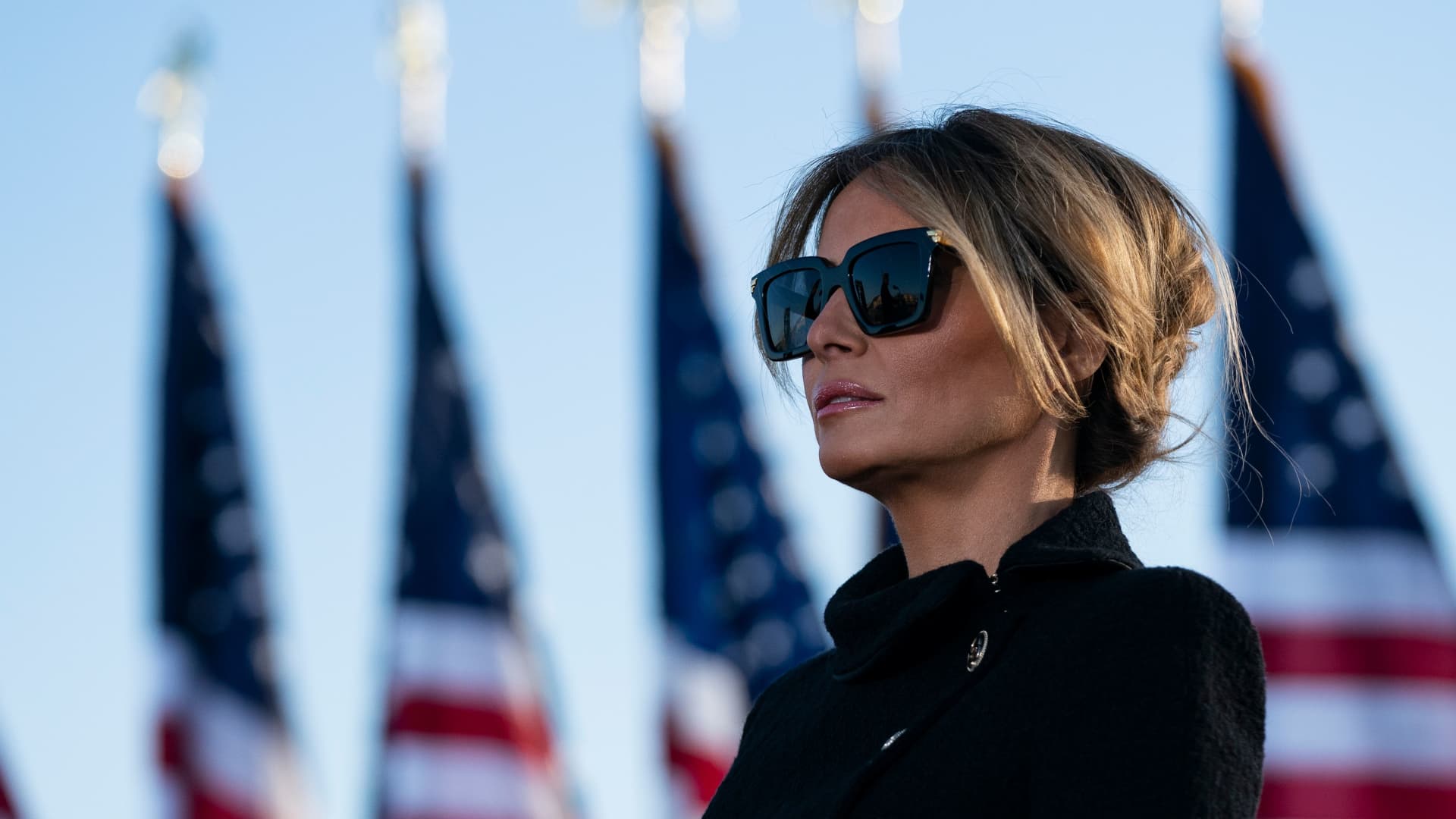Outgoing First Lady Melania Trump listens as her husband Outgoing US President Donald Trump addresses guests at Joint Base Andrews in Maryland on January 20, 2021.
Alex Edelman | Afp | Getty Images
Republican former first lady Melania Trump on Thursday appeared to express strong support for abortion rights, potentially exposing a stark division with her husband, GOP presidential nominee Donald Trump, on a key election issue.
“Individual freedom is a fundamental principle that I safeguard,” Melania Trump said in the latest promo video for her forthcoming memoir, “Melania.”
“Without a doubt there is no room for compromise when it comes to this essential right that all women possess from birth,” she said in the 28-second video posted on X.
“Individual freedom,” the former president’s spouse added. “What does ‘my body, my choice’ really mean?”
The post came less than a day after The Guardian reported that Melania Trump passionately and unequivocally defends total abortion rights in her new book.
“It is imperative to guarantee that women have autonomy in deciding their preference of having children, based on their own convictions, free from any intervention or pressure from the government,” Trump writes in the book, according to the Guardian.
“Why should anyone other than the woman herself have the power to determine what she does with her own body? A woman’s fundamental right of individual liberty, to her own life, grants her the authority to terminate her pregnancy if she wishes,” she reportedly writes.
“Restricting a woman’s right to choose whether to terminate an unwanted pregnancy is the same as denying her control over her own body,” she continues. “I have carried this belief with me throughout my entire adult life.”
CNBC has not obtained a copy of the book, set to be released Tuesday.
The Trump campaign did not immediately respond to CNBC’s request for comment on The Guardian’s report or on Melania Trump’s latest video.
The campaign of Democratic nominee Kamala Harris, however, quickly weighed in.
“Sadly for the women across America, Mrs. Trump’s husband firmly disagrees with her and is the reason that more than one in three American women live under a Trump Abortion Ban that threatens their health, their freedom, and their lives,” Harris spokeswoman Sarafina Chitika said in a statement to CNBC.
“Donald Trump has made it abundantly clear: If he wins in November, he will ban abortion nationwide, punish women, and restrict women’s access to reproductive health care,” Chitika said.
Melania Trump rarely shares her personal political views. And she has been almost completely absent from her husband’s latest presidential campaign.
A perennial wedge issue in American politics, reproductive rights have been front and center ever since June 2022, when the Supreme Court overturned Roe v. Wade. The legal precedent had enshrined federal abortion protections for nearly 50 years.
Trump appointed three of the five conservative justices who cast the deciding votes to abolish Roe and empower individual states to set their own abortion rules.
Now, 20 states have either banned abortion or imposed harsher restrictions than what had been permitted under Roe, according to The New York Times’ analysis.
Trump has repeatedly taken credit for ending Roe, falsely claiming there was unanimous support among legal scholars for eliminating abortion as a constitutional right.
But he has also tried to downplay the significance of the high court’s ruling, which spurred a furious political backlash and remains overwhelmingly unpopular with voters.
The ruling was seen as a key factor in Democrats’ much-better-than-expected performance in the 2022 midterm elections.
Harris and her running mate, Minnesota Gov. Tim Walz, have worked to remind voters of Trump’s role in undoing women’s reproductive rights, and to blame him entirely for the burgeoning women’s health crisis and the public anger triggered by the end of Roe.
During Tuesday night’s vice presidential debate between Walz and Sen. JD Vance, R-Ohio, the Minnesota governor shared stories of individual women who have been negatively affected by new restrictions on reproductive rights.





